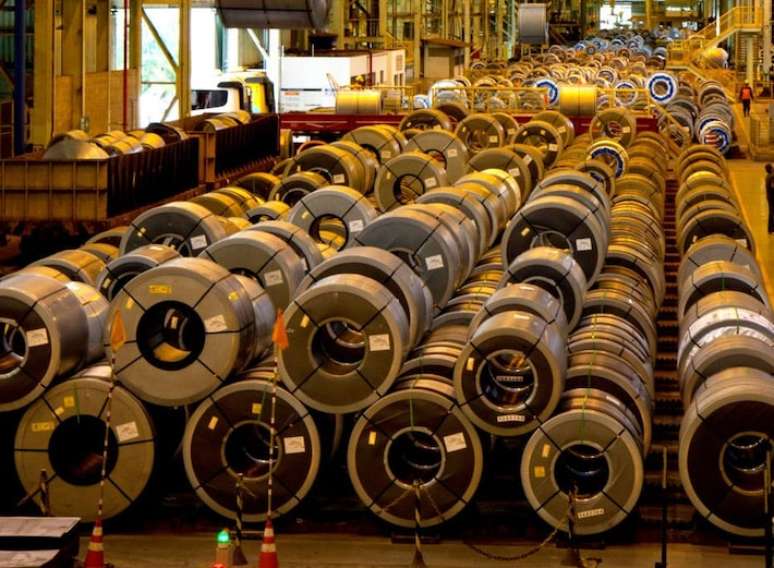The way in which the government will make the quota regime operational is being followed with attention and concern by the sector, which has conditioned investments of 100.2 billion on the effectiveness of the measures
BRASILIA-IL government plans to publish the import quota regulation for 11 items from early June steel industry, announced at the end of April. The institution of quotas – with the import tax increased to 25% on what enters over the limit – has been defined by the Chamber of Foreign Commerce (Camex), but, to come into force, it needs to be regulated.
The Executive had to complete some steps to publish the rules, such as obtaining approval from Mercosur partners. Furthermore, it had to study ways to prevent a rush to purchase products from importers with lower capacity. The provision will be valid for 12 months from the publication of the ordinance.
How the government will operationalize the quota regime is being watched closely and anxiously by the industry. The warning was given this Monday 20th directly to the president Luiz Inácio Lula da Silva and the Vice President and Minister of Industry, Geraldo Alckmin.
The executive president of the Instituto Aço Brasil, Marco Polo de Mello Lopes, in a speech held in the Palácio do Planalto Palace, said that it is “essential” that the “tariff quota” system is efficient and blocks “predatory” imports .
“The system is new in Brazil and will need to be monitored and refined,” Lopes noted.
Technicians have already underlined behind the scenes that the implementation of quotas will require monitoring in several aspects. For example, the government will have to check whether the quota calculation – i.e. the average import between 2020 and 2022 plus 30% – is correct, overestimated or underestimated.
The assessment is that the methodology could be inaccurate, for example, if the import of any of the affected steels reached the quota limit, because then the government would not be able to effectively protect the domestic industry from foreign purchases.
Furthermore, Camex will still have to monitor the behavior of other NCMs not included in the decision, due to the risk that the importation of these items will increase to replace those that will have a surcharge (‘escape NCM’). Finally, Camex will also have to respond to the four steel products that remain on the agenda for a second evaluation. These include steels used in oil or gas pipelines and well casings.
Investments
On Monday, representatives of the steel industry presented President Lula with investments worth 100.2 billion ($19.4 billion) over five years. The initiative was conditioned on the “effectiveness” of the trade and defense control measures adopted by the government.
Alckmin celebrated investment forecasts for the steel industry. Speaking to the press after the meeting, he listed the measures adopted by the government for the sector.
“Today, investments of R$ 100.2 billion are announced. We worked in the MDIC to establish quotas, concerned about steel imports, which led to the inactivity of an important basic industry. We also acted in trade defense , establishing five anti-dumping measures proven dumping mechanisms and ten ongoing investigations (…) This has been understood by the industry and the result is R$100 billion in investments, improved competitiveness, job creation and income. ” Alckmin said.
He assessed the implementation of the tariff quota system as a first step to combat excessive purchasing from China and called for the regime to be implemented effectively and monitored.
The vice president also said Lula is expected to enact accelerated depreciation for industry next week, with tax incentives to encourage industry to invest in new machinery and equipment.
“Accelerated depreciation” works as an anticipation of revenue for companies over a two-year period. The program allows companies to deduct the value of purchases of a capital asset (such as machinery and equipment) in future corporate income tax (IRPJ) and social contribution on net profit (CSLL) declarations.
The text was approved by Congress at the end of April. According to the text approved by both Chambers, this reduction on products purchased in 2024 can take place in two years, and not at most in 25 years, as previously foreseen. The project is one of the priorities on the MDIC agenda.
The government has estimated a tax exemption of up to R$1.7 billion with the program in 2024. According to the text approved by the House and Senate, the amount could be increased by decree if there is space in the Budget.
“Unacceptable” level.
Finance Minister Fernando Haddad said Monday that steel consumption in Brazil is low and expected to increase. He declared this during the ceremony with representatives of the sector.
“I am sure that steel consumption will increase a lot, it is at an unacceptable level,” he said. Haddad said measures in the microeconomic sector allow the government to support trade, industry and services.
According to the minister, Brazil will be more competitive in the global steel market if it focuses on green production. “Green steel will have appeal in the international market,” he said, adding that the product should become the “flagship”.
He defended the creation of a tariff quota for steel imports and said that countries central to the global economy are more protectionist. “Mdic has done very well in eliminating unfair competition (made of steel).” Haddad also said that the country must be aware of geopolitical changes. According to him this does not mean adopting “dogmas without considering the behavior of partners.”
The minister said that Brazil has the capacity to increase its steel production with measures aimed at the automotive industry and with Minha Casa, Minha Vida.
He also asked for the support of industrialists for the regulation of tax reform in Congress and for the vote on the insurance framework. According to Haddad, the Three Powers are building a new economic scenario in alliance with the private sector. He said that “the work must continue”, without being carried away by “dissonant voices”./ With Sofia Aguiar and Caio Spechoto
Source: Terra
Rose James is a Gossipify movie and series reviewer known for her in-depth analysis and unique perspective on the latest releases. With a background in film studies, she provides engaging and informative reviews, and keeps readers up to date with industry trends and emerging talents.






